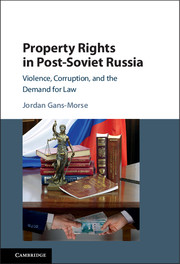Book contents
- Frontmatter
- Contents
- List of Tables
- List of Figures
- Acknowledgments
- 1 Violence, Corruption, and Demand for Law
- 2 Institutional Supply and Demand
- 3 The Evolution of FirmStrategies
- 4 The Role of State Legal Capacity
- 5 Demand-Side Barriers to the Use of Legal Strategies
- 6 The Effectiveness of Illegal Strategies
- 7 Variation in Strategies across Firms
- 8 Firms, States, and the Rule of Law in Comparative Perspective
- Appendices
- A Original Interview Data
- B Original Survey Data
- C Other Surveys Cited or Analyzed
- D Formalizing the Argument
- E Descriptive Statistics for Key Variables
- F Correlations and Cluster Analysis
- G Selected Regression Tables
- References
- Index
D - Formalizing the Argument
from Appendices
Published online by Cambridge University Press: 13 July 2017
- Frontmatter
- Contents
- List of Tables
- List of Figures
- Acknowledgments
- 1 Violence, Corruption, and Demand for Law
- 2 Institutional Supply and Demand
- 3 The Evolution of FirmStrategies
- 4 The Role of State Legal Capacity
- 5 Demand-Side Barriers to the Use of Legal Strategies
- 6 The Effectiveness of Illegal Strategies
- 7 Variation in Strategies across Firms
- 8 Firms, States, and the Rule of Law in Comparative Perspective
- Appendices
- A Original Interview Data
- B Original Survey Data
- C Other Surveys Cited or Analyzed
- D Formalizing the Argument
- E Descriptive Statistics for Key Variables
- F Correlations and Cluster Analysis
- G Selected Regression Tables
- References
- Index
Summary
This appendix presents a simple model that formalizes the key insights introduced in Chapter 2. Specifically, the model demonstrates that: (1) state legal capacity is necessary but frequently insufficient to induce firms’ use of legal strategies for securing property, and (2) firms frequently adopt legal strategies even without heightened state legal capacity, due to declining demand-side barriers or effectiveness of illegal strategies. The analysis also elucidates the mechanisms whereby coordination effects among firms create demand-side barriers to firms’ use of formal legal institutions and illustrates how these coordination effects interact with exogenous parameters of the model.
Model Setup
Consider a game in which a conflict arises between two firms drawn randomly from a large population of firms over an asset with value V. All firms are assumed to be identical. This assumption, while clearly unrealistic, facilitates analysis of the primary question of interest: How levels of state legal capacity, demand-side barriers to firms’ use of formal legal institutions, and the effectiveness of illegal strategies affect firms’ choices about how to secure property. Each firm i has a pure strategy space si = ﹛l, f﹜, where l represents legal strategies and f represents illegal strategies based on force and corruption. Legal strategies include turning to courts and law enforcement agencies. Illegal strategies include reliance on criminal protection rackets or informal ties with state bureaucrats and law enforcement personnel to resolve business conflicts. An endogenous proportion λl of firms rely on legal strategies, while a proportion 1 − λl rely on illegal strategies. More realistically, but with the same implications for the model, λl can be interpreted as the proportion of each firm's portfolio of property security strategies based on law, and 1 − λl as the proportion of each firm's portfolio of property security strategies based on force and corruption.
When the conflict begins, the two firms choose their strategies simultaneously, representing firms’ inability to observe the preferred strategies of other individual firms. After both firms choose a strategy, payoffs are realized, and the game ends.
Payoffs
The payoffs to a conflict reflect the three variables in the framework developed in Chapter 2 – state legal capacity, demand-side barriers, and the effectiveness of illegal strategies – and depend on the profile of strategies chosen by the two firms.
- Type
- Chapter
- Information
- Property Rights in Post-Soviet RussiaViolence, Corruption, and the Demand for Law, pp. 218 - 225Publisher: Cambridge University PressPrint publication year: 2017



